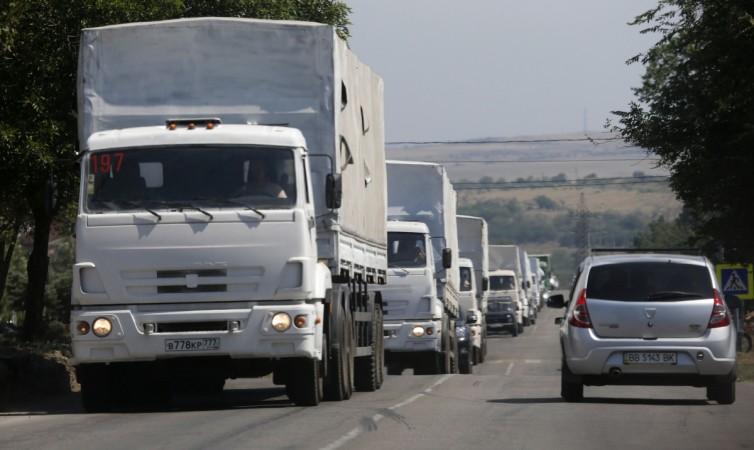
The Ukraine-Russia conflict hit dangerous new heights on Friday, after the Russian aid convoy of nearly 300 trucks entered the Ukrainian border despite Kiev's objection. The alleged 'intrusion' came amid reports from NATO that Ukrainian troops were facing Russian artillery fire from inside the borders.
It is not clear if Russian military infiltrated into the borders via the trucks as feared by Western allies, but the controversial manoeuvre of forcibly entering the borders without permission came amid reports of the major escalation in Russian military involvement in Eastern Ukraine since mid-August, including the use of Russian forces, according to NATO.
"I condemn the entry of a Russian so-called humanitarian convoy into Ukrainian territory without the consent of the Ukrainian authorities and without any involvement of the International Committee of the Red Cross," NATO Secretary General Anders Fogh Rasmussen said.
"Russian artillery support –both cross-border and from within Ukraine – is being employed against the Ukrainian armed forces," he added. "We have also seen transfers of large quantities of advanced weapons, including tanks, armoured personnel carriers, and artillery to separatist groups in Eastern Ukraine. Moreover, NATO is observing an alarming build-up of Russian ground and air forces in the vicinity of Ukraine."
Accusing Moscow of a "blatant breach of Russia's international commitments" Rasmussen said that Kremlin's disregard for the humanitarian principles "raises questions about whether the true propose of the aid convoy is to support civilians or to resupply armed separatists."
Meanwhile, NATO's statement, which has been noted as the strongest denunciation of Russia's role in Ukraine yet, was also backed by US, which accused Russia of increasing tensions in the region.
"Russia should not send vehicles, persons or cargo of any kind into Ukraine, whether under the guise of humanitarian convoys or any other pretext, without Kyiv's express permission," Pentagon spokesman John Kirby told reporters.
Kirby stopped short of calling the move a direct invasion, but reiterated nevertheless, that it amounts to a violation of Ukraine's sovereignty and territorial integrity.
"Russia must remove its vehicles and its personnel from the territory of Ukraine immediately. Failure to do so will result in additional costs and isolation," he said.
In its response, Russia's Foreign Ministry said in a statement Friday that Moscow had run out of patience with "delays" and other "excuses" from Ukraine even after a long wait. It said Ukraine was deliberately trying to withhold the delivery of aid to the war-torn region of Luhansk until "there is no one at all to provide help to."
The White House separately condemned Russia's 'violation of Ukraine's sovereignty'.
"At the same time as Russian vehicles violate Ukraine's sovereignty, Russia maintains a sizeable military force on the Ukrainian border capable of invading Ukraine on very short notice," the Washington Post quoted Caitlin Hayden, spokeswoman for the National Security Council. "We recall that Russia denied its military was occupying Crimea until it later admitted its military role and attempt to annex this part of Ukraine."

















